การพัฒนารูปแบบการจัดประสบการณ์การเรียนรู้เพื่อเสริมสร้างทักษะทางภาษาสำหรับเด็กปฐมวัย
Main Article Content
บทคัดย่อ
บทความวิจัยนี้มีวัตถุประสงค์ 1. เพื่อศึกษาปัญหาและแนวทางในการพัฒนารูปแบบการจัดประสบการณ์การเรียนรู้เพื่อเสริมสร้างทักษะทางภาษาสำหรับเด็กปฐมวัย 2. เพื่อพัฒนารูปแบบฯ 3. เพื่อศึกษาผลการใช้รูปแบบฯ 4. เพื่อประเมินการใช้รูปแบบฯ ดำเนินการวิจัยเป็น 4 ระยะ ดังนี้ ระยะที่ 1 ศึกษาปัญหาและแนวทางในการพัฒนารูปแบบฯ ประชากรที่ศึกษา ครูปฐมวัย จำนวน 222 คน ระยะที่ 2 พัฒนารูปแบบฯ ตัวอย่างคือ เด็กปฐมวัยชั้นอนุบาลปีที่ 3 จำนวน 30 คน ระยะที่ 3 การทดลองใช้รูปแบบฯ ตัวอย่างประกอบด้วย เด็กปฐมวัยชั้นอนุบาลปีที่ 3 กลุ่มทดลอง จำนวน 25 คน กลุ่มควบคุม จำนวน 25 คน และระยะที่ 4 การประเมินการใช้รูปแบบโดยผู้ทรงคุณวุฒิ จำนวน 5 คน เครื่องมือที่ใช้ประกอบด้วย แบบสอบถามความคิดเห็นครูเกี่ยวกับปัญหาและแนวทางในการพัฒนารูปแบบฯ รูปแบบการจัดประสบการณ์การเรียนรู้ และแบบทดสอบวัดทักษะทางภาษา สถิติที่ใช้ ได้แก่ ค่าเฉลี่ย ร้อยละ ส่วนเบี่ยงเบนมาตรฐาน และค่า t-test
ผลการวิจัยพบว่า ปัญหาโดยรวมอยู่ในระดับมาก มีค่าเฉลี่ย 3.71 ( = 3.71, S.D. = 0.35) ความคิดเห็นของครูเกี่ยวกับแนวทางในการพัฒนารูปแบบฯ โดยรวมมีค่าเฉลี่ยอยู่ในระดับมาก มีค่าเฉลี่ย 4.01 (
= 4.01, S.D. = 0.30) รูปแบบฯ ประกอบด้วย 5 องค์ประกอบ ได้แก่ หลักการ วัตถุประสงค์ เนื้อหา กระบวนการจัดประสบการณ์ การวัดและประเมินผล โดยมีกระบวนการจัดกิจกรรม 6 ขั้น ได้แก่ กระตุ้นความสนใจ สาธิต ลงมือปฏิบัติด้วยความเข้าใจ สร้างสรรค์ผลงานทางภาษา นำไปประยุกต์ใช้ และประเมินผล ผลการใช้รูปแบบฯ พบว่า หลังการจัดประสบการณ์กลุ่มทดลองมีค่าเฉลี่ยทักษะทางภาษาเท่ากับ 50.32 (
= 50.32, S.D. = 3.13) กลุ่มควบคุม มีค่าเฉลี่ยทักษะทางภาษาเท่ากับ 38.04 (
= 38.04, S.D. = 6.37) แสดงว่า เด็กปฐมวัยกลุ่มทดลองมีทักษะทางภาษาสูงกว่าเด็กปฐมวัยที่เรียนด้วยวิธีปกติ อย่างมีนัยสำคัญทางสถิติที่ระดับ .01 การประเมินการใช้รูปแบบฯ โดยผู้ทรงคุณวุฒิ จำนวน 5 ท่าน สรุปได้ว่า ควรจัดกิจกรรมกระตุ้นความสนใจผู้เรียน ให้เด็กอาสาสมัครร่วมการสาธิตกิจกรรมเพื่อให้เกิดความเข้าใจก่อนลงมือปฏิบัติด้วยตนเอง จัดหาสื่อที่หลากหลายและสอดคล้องกับการใช้ภาษาในชีวิตประจำวัน มีการประเมินผลโดยผู้เรียน ผู้ปกครองร่วมกับครู เพื่อสะท้อนผลการพัฒนาได้อย่างมีประสิทธิภาพ
Article Details

อนุญาตภายใต้เงื่อนไข Creative Commons Attribution-NonCommercial-NoDerivatives 4.0 International License.
ทัศนะและความคิดเห็นที่ปรากฏในบทความในวารสาร ถือเป็นความรับผิดชอบของผู้เขียนบทความนั้น และไม่ถือเป็นทัศนะและความรับผิดชอบของกองบรรณาธิการ ยินยอมว่าบทความเป็นลิขสิทธิ์ของวารสาร
เอกสารอ้างอิง
Boonchaleo, J., Suwan, P., & Chantamolee, S. (2021). The Development of a Model to Promote Language Development of Suspected Children Has Delayed Community Development Through Participation of Communities in Sawaengha District, Ang Thong Province. Journal of Social Science and Buddhistic Anthropology, 6(1), 52-69.
Boopphamatanang, N., & Nakunsong, T. (2021). Organizing Experiences according to Language Balance to Promote Ability Aspects of Reading and Writing in Early Childhood. MCU Ubon Paritharat Journal, 5(2), 649-661.
Buasan, R. (2011). Research and Development of Educational Innovation. Phitsanulok: Naresuan University.
Chaiyakaraphong, N. et al. (2019). Development of an Experience-Focused Model, Experiences to Promote English Communication Skills for Early Childhood Children. Research and Development Journal Valaya Alongkorn under the Royal Patronage, 14(1), 52-62.
Jatisathien, C. et al. (2017). Early Childhood Crisis and Solutions. Bangkok: Plus Press.
Kalapat, P. (2015). Development of Learning Experience Formats to Enhance Language Skills, Holistic for Early Childhood Children. (Doctoral Dissertation). Faculty of Education, Maha Sarakham University. Mara Sarakham.
Kanongdet, K. et al. (2020). Results of Organizing Experiences Using Media and Toys on EF Skills. (Executive Functions) of Early Childhood Children in Schools Participating in Teacher Professional Development Provincial Area Southern Border. (Research Report). Yala: Yala Rajabhat University.
Khamchuang, S. (2015). Development of a Model to Promote Reading Habits for Early Childhood Children Through the Participation of Parent. (Doctoral Dissertation). Curriculum Innovation and Learning Mahasarakham University. Maha Sarakham.
Krejcie, R. V., & Morgan, D. W. (1970). Determining Sample Size for Research Activities. Educational and Psychological Measurement, 30(3), 607-610.
Ministry of Education. (2017). Early Childhood Curriculum 2017. Bangkok: Printing House, Agricultural Cooperatives Association of Thailand Co., Ltd.
Office of Academic Studies and Educational Standards. (2017). Early Childhood Education Curriculum 2017. Bangkok: Agricultural Cooperatives Association of Thailand.
Office of the Prime Minister. (2017). Twelfth National Economic and Social Development Plan 2017-2021. Bangkok: Office of the National Economic and Social Development Board.
Phewphan, A. (2017). Results of Organizing Experiences according to Natural Language Teaching Methods on Language Development in Listening and Speaking Skills of Early Childhood Children Who Use Thai as a Second Language. (Master's Thesis). Chiang Rai Rajabhat University. Chiang Rai.
Sisaket Primary Educational Service Area Office 1. (2022). Annual Report 2022 Sisaket Primary Educational Service Area Office 1. Retrieved September 2, 2022, from https://bit.ly/3ZJuTw1
Sivakornphurihiran, K. (2018). Development of Early Childhood Teacher Development Programs in Organizing Experiences. Holistic Language for Educational Institutions under the Jurisdiction of the Kalasin Educational Service Area Office, Area 2. (Master’s Thesis). Mahasarakham Rajabhat University. Maha Sarakham.
Thamnamsil, J. (2019). Development of a Supervisory Model for Organizing Learning Experiences to Prepare Language Aspects of Early Childhood Children. (Doctoral Dissertation). Mahasarakham University. Maha Sarakham.
Titsuntharothayan, P. (2019). Model of Teaching Methods for Reading Skills of Early Childhood Children in Schools under Bangkok. Journal of Educational Studies Bansomdejchaopraya Rajabhat University, 13(2), 61-76.
Wanichbancha, K. (2023). Statistics for Research. (14th ed.). Bangkok: Samlada.
Wichasri, M. (2018). Guidelines for Developing Experiences according to the Montessori Concept for Children. Early Childhood Education of Educational Institutions under the Kalasin Primary Educational Service Area Office, Area 2. (Master’s Thesis). Mahasarakham Rajabhat University. Maha Sarakham.


